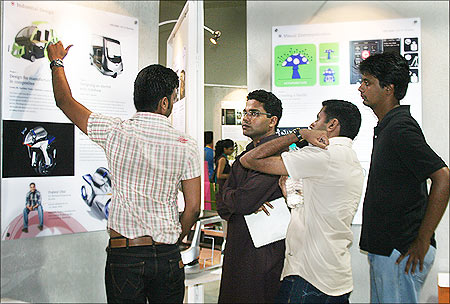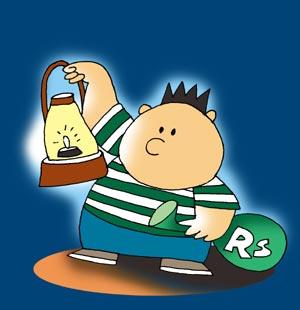Photographs: Rediff Archives Team Careers360
Which college, which course, is there a job at the end? The decision tree for a college is very complex. Careers360 decodes it for you.
Nausheen Ahmed faced a dilemma.
Should she take up Culinary Arts at Grande Ecole in Switzerland, a course she was desperately interested in or pursue fashion design course at an institute nearer home, which her parents approve of?
Vydiyanatha Sarma too was in a dilemma.
Dear readers: Help students with their college admissions!
He had the choice of studying Mechanical Engineering at NIT Jamshedpur or Engineering Physics at IIT Bombay. Dr Sanjay Banerji, Professor Emeritus from Amrita Vishwa Vidyapeetham recounts the story of a student who was almost in tears since she had to do Commerce instead of Arts, because her parents disapproved her choice.
Students often face dilemna while choosing the right course and college after class 12. Here are some tips to help you decide. Read on.
Please click NEXT to continue reading
1. Getting started
Course or institute, personal preferences or market values, safety of the local or the lure of the unknown, the choices before today's student are innumerable.
But there are no straight answers to these questions.
"In today's world, an individual may pursue three to four distinct careers in their work-life spanning the next 30 to 40 years.
It could be as diverse as engineering and adventure sports to music. So, one has train oneself for transferable skills and learn the ability to quickly unlearn and relearn," observes renowned psychologist Prof Rajni Arya.
Dear readers: Help students with their college admissions!
Illustration: Uttam Ghosh
2. First, reject what you don't like
When faced with multiple choices use the negative selection approach, suggests Ruma Guman, a student counsellor at Fairspring School, Ayanagar.
Reject the choices that you will not take. It would be easier to zero in on what matters to you most. This is what Vydiyanatha did. He did not want Engineering Physics. And the decision was made.
"It is not that I was very fond of metallurgy," he explains.
"But I did do it well and got a great job," he says. Vydiyananthan is currently Senior Manager with Coal India. Unless you are specifically interested in a generic course, it is always better to do a professional programme.
Between a BSc (Physics) and BE (Mechanical) choose BE. Between a BCom and CS choose a Company Secretary. That way at the end of the course you do have a specific job profile to start with, says Pervin Malhotra, a prominent career counsellor based in Delhi.
As for Nausheen, she waged many battles with her parents who eventually let her study Culinary Arts, her main interest. Today, she works as Sous Chef at a Michelin star restaurant.
3. Course vs college
A common dilemma faced by students is whether to go for a college with a brand name, or a course they enjoy. It is a subjective decision.
According to Dr Sanjay Srivastava, Deputy Director General, Amity Business School, the college matters a lot when it comes to placement-linked programmes like MBA, BE or even MCA.
Pursuing the degree from a well-known college puts you in a different league.
Nirmala Deshpande a student at New Delhi's St. Stephen's, has a slightly different view. She felt that even for a general course like BA (Economics), the college matters.
According to her, an SRCC or St Stephen's opens many doors. While issues regarding personal interest and quality of education are valid, unless you have absolutely no interest in the subject offered, a reasonably okay subject from a great college appears to be the first preference vis-a-vis a very good subject from an average college.
In fact, an engineering student at NIT Trichy shares that Metallurgy in this college is preferable to a circuit branch (Electronics, IT, Computer science) at a lower ranking NIT like NIT Sikkim. But the final call is yours.
Dear readers: Help students with their college admissions!
Illustration: Uttam Ghosh
4. Interest versus market value
"Will I get a job if I do this course?" is the prime question eight out of 10 students ask when they consider a degree programme.
But Kris Lakshmikanth, Founder and CEO, Headhunters India, asks different questions. It is your interest that must drive education, he says.
Careers are passionate affairs and unless one enjoys what one is doing, excellence can never be achieved and sustained, is his conviction.
Ravi Tejus concurs. After an MTech in computer systems, he gave it up to start an adventure sports academy.
"I wasted 10 years of my adult life seeking happiness in IT. It did not work out. I had to give it up and start afresh on what I love, and I am enjoying every bit of it," he says.
But the road towards what you like is not paved in gold. Kris says, it is quite painful initially when you follow the dictates of the heart. It is downright painful, agrees Ravi.
"I was jobless, penniless. And my wife almost threatened to leave me, during the initial years of the academy!" he shares.
Dear readers: Help students with their college admissions!
Illustration: Uttam Ghosh
5. Should I specialise at UG level?
With the arrival of new universities, the vanilla BA and BSc have given way to BS, BBA, BIFA, BSc (Tech) and so on. Subjects like Applied Nutrition, Biotechnology, Nanotechnology, are offered at the undergraduate level.
Prof. Ramaswamy, Senior Academic at a leading university argues that it is the way to go.
Today's economic environment focuses on specialisation, and one needs to build capabilities tuned to the industry needs even at the early stage, he says.
On the other hand, Prof. Imran Siddiqui, a prominent biologist working with the Centre for Cellular and Molecular Biology, Hyderabad, is very clear that a basic degree is the way to go.
The issue becomes much more complicated when one does a programme like BBA or MBA where the courses, specialisations and even core text books are similar between the two programmes.
Ravi Dayal, Director, Staff Right has a different take.
He says students with BBA, BBS, BMS are a straight fit for entry-level roles in admin, secretarial, coordination, sales and human resources jobs.
But he cautions, after about 2-3 years on the job, when it comes to promotions a Master's degree is usually sought after. On the other hand, courses like BSc in Retail or Hospitality can be launch pads for jobs in these sectors since the training is tuned to the needs of the industry.
Dear readers: Help students with their college admissions!
Illustration: Uttam Ghosh
6. Do lots of projects and internships
Image: Image for representation purpose onlyPhotographs: Satish Bodas
Chandramauli, a student of BFIA at Delhi University agrees that both these activities open doors.
An alumnus from the 2010 batch, he currently works as an assistant at an investment advisory firm.
He credits his job to the mandatory summer internships he did in all the three years, as well as the regular industry interfaces the school organised. Chandra met his boss at one such interface.
His probing questions were noticed and he was offered an internship initially, which later extended to a position. But not all schools offer such value, he says and cautions students about job-oriented programmes.
Visit the campus and see for yourself.
A crowded notice board packed with events is a good sign, he says.
The general consensus is that unless one is exceptionally interested in a particular specialisation and is sure about the programme's value and the school's reputation, it makes sense to keep options open and diverse at the UG level.
7. Cost: A prime factor
Though government colleges and private institutes offer industry-oriented programmes, the latter tend to charge a much higher fee, some costing up to Rs 4 lakhs for a three-year programme.
Aditya Narayan Mishra, CMO & VP -- Staffing, Ma Foi Randstad, cautions students and parents to ask the admissions in-charge questions on the value proposition.
"The intention of the institute may be to invite industry people to deliver lectures or make students participate in real-time projects. But has the action happened? I know of institutes where a student has to spend a minimum number of hours or days in a week at a company doing real work," he shares.
Dear readers: Help students with their college admissions!
Illustration: Uttam Ghosh
8. Is it recognised?
Photographs: Careers360
In an over-regulated sector like education, the validity and relevance of your degree matters a lot.
"I went to do the Bachelor of Elementary Education (B.El.Ed) and now I can't be a teacher," laments Nisha Kothari.
Her grouse comes from the fact that many States have not explicitly recognised her programme as being eligible for teaching primary school children, though experts do agree that it is one of the finest programme on primary education offered in the country.
So do check if your degree is valid. Another difficulty is multiple recognitions.
A university might be well within its rights to design and offer a MSc in business Law. But if the Bar Council does not approve it one cannot practise in a court of law.
The recent spat between Pharmacy Council and National Institute of Pharmaceutical Education and Research is a case in point.
9. Don't worry, be positive
At the end of the day the magical score that you get in your 10+2 decides which college you go to and what course you study.
But whichever option you choose, as Infosys chief mentor Narayana Murthy says, "I would suggest to the students not to worry too much about which college they go to as long as they get the best out of whatever education they are being given."
Dear readers: Help students with their college admissions!
Illustration: Uttam Ghosh











Comment
article